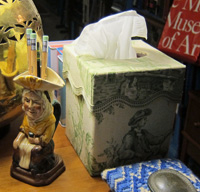Gotham Diary:
Miserable
Tuesday, 14 June 2011
What’s worst about the cold that I’m battling at the moment is the likelihood that it will force a postponement of the Remicade infusion that has been scheduled for tomorrow, Wednesday afternoon. What’s almost as bad is suffering the indignities of a bad cold — sniffling, sneezing, hacking and hawking — alongside the miseries, great and small, that Remicade suppresses. The last dose has been exhausted in the fight against my over-active autoimmune system, and I’m once again under imflammatory attack.
I’m scribbling this note in the morning, because I not only the energy but the will do so. This afternoon, if yesterday’s experience is anything to go by, I shall slip into a black funk of purposelessness that will feel a lot like despair. The only treatment is reading, which at a time like this really does make me forget myself (between sneezes). I’m in the middle of two good books, Diarmaid MacCulloch’s Christianity and Angus Wilson’s Anglo-Saxon Attitudes. In the first, I’ve just finished with medieval Christianity in the West, and will now turn to the East, for about a hundred pages of Byzantium and Russia. I shall try to get through that today. As to the novel, it’s perfect reading for the pickle I’m in, because everybody is at least mildly discontented, and at least one character — I’m thinking of Ingeborg Middleton and her demented and disappointing Christmas carol party — strikes me as borderline psychotic in a Tennessee Williams way, although, refreshingly, not from the South. What could be more miserable than England in 1954? (I’m not asking.)
Knowing how wretched I was, Kathleen was resolved to play Sheherazade last night, or our version of that fable, which consists of provoking me into rambling on about one of my hobby-horses. She had no idea, however, of how to begin. I was bearishly clamped and cross. But a glass of wine (and some Advil) warmed me up a bit, and I started talking, without any prompts, about things that I’d read in MacCulloch, familiar things for the most part that he reminded me of. For example, “the rediscovery in Italy around 1070 of two copies of a compilation of imperial law,” which triggered the launch of the first university, at Bologna, and the formalization of the fine art of medieval forgery (which MacCulloch glancingly mentions), according to which it was perfectly all right to “reproduce” lost or missing charters.
We can call them forgeries, but our attitudes to such matters are conditioned by the humanist historical scholarship which emerged in Italy in the fifteenth century. That leads us to expect that our history must be based on carefully checked and authenticated evidence, or it simply cannot exist. For centuries before, though, people lived in societies which did not have enough documents to prove what they passionately believed to be true: the only solution was to create the missing documentation.
I don’t know how Kathleen sits through these ruminations, but she keeps me going with questions, and she claims that she enjoys learning what I have to say. Perhaps she just likes the sound of my voice. In any case, I’m not so miserable after all.

